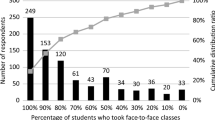Abstract
The goal of the current study was to examine novice researchers’ views about online ethics education and to identify the instructional design components that may foster ethical practice. Applying the mixed methods approach, data were collected via a survey and semi-structured interviews among M.Sc. and Ph.D. students in science and engineering. The findings point to the need for rethinking the way conventional online ethics courses are developed and delivered; encouraging students to build confidence in learning from distance, engaging them in online active and interactive experiences, and providing them with personalized support and adaptive guidance. The novice researchers identified the synergistic integration of collaborative, case-based, and contextual learning, as the instructional design components that may foster not only ethical knowledge but also ethical practice in a fully online course.


Similar content being viewed by others
References
Anderson, M. A. (2016). Pedagogical support for responsible conduct of research training. Hastings Center Report,46(1), 18–25.
Antes, A. L., Murphy, S. T., Waples, E. P., Mumford, M. D., Brown, R. P., Connelly, S., et al. (2009). A meta-analysis of ethics instruction effectiveness in the sciences. Ethics & Behavior,19(5), 379–402.
Antes, A. L., Kuykendall, A., & DuBois, J. M. (2019). The lab management practices of “research exemplars” that foster research rigor and regulatory compliance: A qualitative study of successful principal investigators. PLoS ONE,14(4), e0214595.
Bagdasarov, Z., Thiel, C. E., Johnson, J. F., Connelly, S., Harkrider, L. N., Devenport, L. D., et al. (2013). Case-based ethics instruction: The influence of contextual and individual factors in case content on ethical decision-making. Science and Engineering Ethics,19(3), 1305–1322.
Barak, M. (2017). Science teacher education in the twenty-first century: A pedagogical framework for technology-integrated social constructivism. Research in Science Education,47, 1–21.
Barak, M., & Levenberg, A. (2016). A model of flexible thinking in contemporary education. Thinking Skills and Creativity,22, 74–85.
Barak, M., & Usher, M. (2019). The innovation profile of nanotechnology team projects of face-to-face and online learners. Computers & Education,137, 1–11.
Barak, M., Hussein-Farraj, R., & Dori, Y. J. (2016). On-campus or online: Examining self-regulation and cognitive transfer skills in different learning settings. The International Journal of Educational Technology in Higher Education,13(1), 1–18.
Braunschweiger, P., & Goodman, K. W. (2007). The CITI program: An international online resource for education in human subjects' protection and the responsible conduct of research. Academic Medicine,82(9), 861–864.
Briggle, A., & Mitcham, C. (2012). Ethics and science: An introduction. Cambridge: Cambridge University Press.
Cohen, J. (1968). Weighted kappa: nominal scale agreement with provision for scaled disagreement or partial credit. Psychological Bulletin,70, 213–220.
Cohen, J. (1988). Statistical power analysis for the behavioral sciences (2nd ed.). Hillsdale: Erlbaum.
Corbin, J., & Strauss, A. (2014). Basics of qualitative research: Techniques and procedures for developing grounded theory. London: Sage.
Creswell, J. W. (2014). Research design: Qualitative, quantitative, and mixed methods approaches. Thousand oaks: SAGE Publications.
Field, A. (2013). Discovering statistics using IBM SPSS statistics (4th ed.). London: Sage Publications.
Gross, C. (2016). Scientific misconduct. Annual Review of Psychology,67, 693–711.
Hussein-Farraj, R., Barak, M., & Dori, Y. J. (2012). Lifelong learning at the technion: Graduate students' perceptions of and experiences in distance learning. Interdisciplinary Journal of E-Learning and Learning Objects,8(1), 115–135.
Kutner, M. H., Nachtsheim, C., & Neter, J. (2004). Applied linear regression models. McGraw-Hill, Irwin.
Lave, J., & Wenger, E. (1991). Situated learning: Legitimate peripheral participation. Cambridge: Cambridge University Press.
Little, T. D. (Ed.). (2013). The oxford handbook of quantitative methods: Foundations, Vol. 1. New York: Oxford University Press.
National Institutes of Health (NIH). (2010). NOT-OD-10–019. Retrieved July 26, 2019, from: https://grants.nih.gov/grants/guide/notice-files/NOT-OD-10-019.html
National Science Foundation (NSF). (2009). Responsible conduct of research. NSF’s implementation of Section 7009 of the America COMPETES Act. Federal Register,74(160), 42126–42128.
Phillips, T., Nestor, F., Beach, G., & Heitman, E. (2018). America COMPETES at 5 years: An analysis of research-intensive universities’ RCR training plans. Science and Engineering Ethics,24(1), 227–249.
Pinkus, R. L., Gloeckner, C., & Fortunato, A. (2015). The role of professional knowledge in case-based reasoning in practical ethics. Science and Engineering Ethics,21(3), 767–787.
Shamoo, A., & Resnik, D. (2015). Responsible conduct of research. New York: Oxford University Press.
Stavale, R., Ferreira, G. I., Galvão, J. A. M., Zicker, F., Novaes, M. R. C. G., Oliveira, C Md, et al. (2019). Research misconduct in health and life sciences research: A systematic review of retracted literature from Brazilian institutions. PLoS ONE,14(4), e0214272.
Steneck, N. H. (2013). Global research integrity training. Science,340, 552–553.
Todd, E. M., Watts, L. L., Mulhearn, T. J., Torrence, B. S., Turner, M. R., Connelly, S., et al. (2017). A meta-analytic comparison of face-to-face and online delivery in ethics instruction: The case for a hybrid approach. Science and Engineering Ethics,23(6), 1719–1754.
Usher, M., & Barak, M. (2018). Peer assessment in a project-based engineering course: Comparing between on-campus and online learning environments. Assessment and Evaluation in Higher Education,43(5), 745–759.
Watted, A., & Barak, M. (2018). Motivating factors of MOOC completers: Comparing between university-affiliated students and general participants. The Internet and Higher Education,37, 11–20.
Watts, L. L., Medeiros, K. E., Mulhearn, T. J., Steele, L. M., Connelly, S., & Mumford, M. D. (2017). Are ethics training programs improving? A meta-analytic review of past and present ethics instruction in the sciences. Ethics & Behavior,27(5), 351–384.
Willig, C. (2013). Introducing qualitative research in psychology. Buckingham: Open University.
Author information
Authors and Affiliations
Corresponding author
Additional information
Publisher's Note
Springer Nature remains neutral with regard to jurisdictional claims in published maps and institutional affiliations.
Rights and permissions
About this article
Cite this article
Barak, M., Green, G. Novice Researchers’ Views About Online Ethics Education and the Instructional Design Components that May Foster Ethical Practice. Sci Eng Ethics 26, 1403–1421 (2020). https://doi.org/10.1007/s11948-019-00169-1
Received:
Accepted:
Published:
Issue Date:
DOI: https://doi.org/10.1007/s11948-019-00169-1




